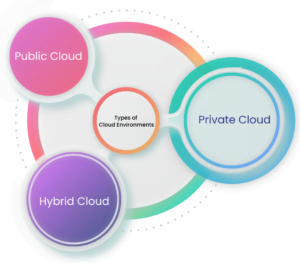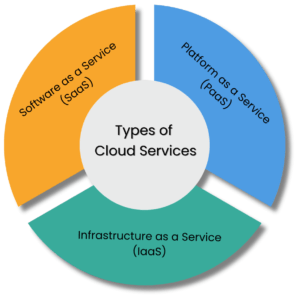
Cloud service is a term you hear often, but what does it really mean? Imagine accessing all your favourite apps, documents, and resources from any device with an internet connection, without needing to install anything on your computer. This is the magic of cloud services, a technology that has transformed the way we work, communicate, and manage information.
What is a Cloud Service?
A cloud services is like a digital utility that provides easy and affordable access to various applications and resources over the internet. Instead of having to set up and maintain physical hardware and infrastructure, you can simply use services managed by cloud computing vendors. This can range from checking your email to collaborating on documents with colleagues. Essentially, cloud services allow you to use powerful tools without the hassle of managing the underlying technology.
How Cloud Services Work?
Cloud services are hosted on the servers of providers like Amazon Web Services (AWS), Microsoft Azure, and Google Cloud. These providers manage everything, so you don’t have to worry about maintenance, updates, or security. All you need is an internet connection, and you can access these services from anywhere in the world.
 When it comes to cloud services, there are three main environments to consider:
When it comes to cloud services, there are three main environments to consider:- Public Cloud: This is where services are available to multiple customers over the internet. Think of it like a shared workspace where everyone can access the same tools. Examples include email services, online storage, and collaboration tools.
- Private Cloud: This is a dedicated environment for one organization, providing exclusive access to their applications and data. This setup is ideal for companies handling sensitive information, like banks or healthcare providers, as it offers enhanced security and control.
- Hybrid Cloud: This is a mix of public and private clouds, allowing organizations to keep sensitive data secure in a private cloud while using public cloud services for everyday tasks. This combination provides flexibility and optimized resource usage.
 Cloud services can be broadly categorized into three types:
Cloud services can be broadly categorized into three types:- Software as a Service (SaaS): This is the most common type, where applications are delivered over the internet. Examples include email services like Gmail, file storage services like Dropbox, and project management tools like Trello. With SaaS, you can access and use software without worrying about installation or maintenance.
- Infrastructure as a Service (IaaS): This provides virtualized computing resources over the internet. It’s like renting a virtual data center where you can host websites, store data, and run applications. Major IaaS providers include AWS, Microsoft Azure, and Google Compute Engine.
- Platform as a Service (PaaS): This offers a development environment for building and deploying applications. It provides all the necessary tools and infrastructure, so developers can focus on coding without worrying about the underlying hardware. Examples include Google App Engine and Microsoft Azure.
Using cloud services comes with several advantages:

- Scalability: Cloud services allow you to scale up or down based on your needs. Whether you’re expanding your team or launching a new product, you can easily adjust your resources without investing in new hardware.
- Cost Savings: Since cloud services are usually offered on a subscription basis, you can avoid the high costs of purchasing and maintaining physical infrastructure. You pay only for what you use, making it a cost-effective solution for businesses of all sizes.
- Flexibility: With cloud services, you can access your applications and data from anywhere, at any time. This is particularly useful for remote work and collaboration across different locations.
- Automatic Updates: Cloud service providers handle all updates and maintenance, ensuring that you always have access to the latest features and security patches.
- Enhanced Security: Reputable cloud service providers implement robust security measures to protect your data. This includes encryption, regular backups, and advanced threat detection systems.
Future of Cloud Services
As technology continues to evolve, the role of cloud services in our lives will only grow. Companies are increasingly adopting cloud-based solutions to streamline operations, enhance productivity, and improve customer experiences. The future will likely see even more integration of cloud services into everyday tasks, making them an indispensable part of both personal and professional life.
Simple Logic’s Cloud Services
At Simple Logic, we understand the importance of cloud services for modern businesses. Our goal is to help you adopt the right cloud solutions that fit your specific needs. Whether you require a private cloud for sensitive data or want to leverage multiple public cloud services, we’ve got you covered.
- Tailored Solutions: We offer a range of cloud services from top providers like AWS, Google Cloud, and Microsoft Azure. This allows you to choose the best options for your business requirements.
- Expert Support: Our team of cloud experts will guide you through the adoption process, ensuring a smooth transition and optimal performance.
- Scalability: With our cloud services, you can easily scale your operations as your business grows, without worrying about infrastructure limitations.
- Security: We prioritize the security of your data, implementing advanced measures to protect against threats and ensure compliance with industry standards.
Get Started with Cloud Services
Embracing cloud services with Simple Logic is a step towards greater efficiency, flexibility, and innovation. Whether you’re a small business looking to streamline operations or a large enterprise aiming for digital transformation, our cloud solutions can help you achieve your goals.
Contact us today to explore how our cloud services can benefit your organization. Let Simple Logic be your partner in navigating the cloud landscape and unlocking new opportunities for growth and success.

